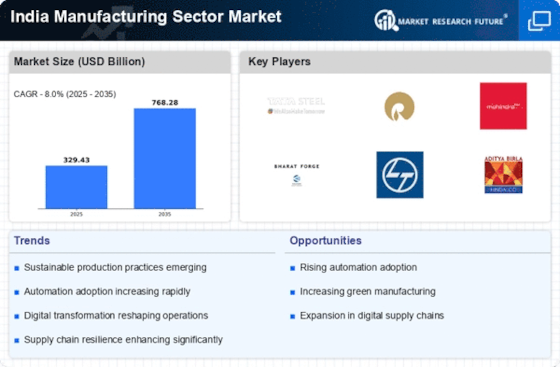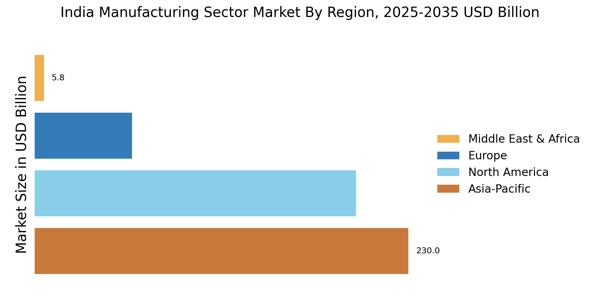Focus on Export Opportunities
The India Manufacturing Sector Market is increasingly focusing on export opportunities as a means to drive growth. With a diverse range of products, from textiles to machinery, Indian manufacturers are looking to expand their reach in international markets. The government has implemented various measures to promote exports, including the Merchandise Exports from India Scheme (MEIS), which provides incentives for exporters. Recent data suggests that India's merchandise exports are expected to reach USD 400 billion by 2025, highlighting the potential for manufacturers to tap into global demand. This focus on exports not only enhances revenue for manufacturers but also contributes to the overall economic growth of the country.
Rising Demand for Consumer Goods
The India Manufacturing Sector Market is experiencing a surge in demand for consumer goods, driven by a growing middle class and increasing disposable incomes. As urbanization continues to rise, consumer preferences are shifting towards quality and branded products. This trend is reflected in the rapid growth of sectors such as textiles, electronics, and automobiles, which are expected to see a significant uptick in production. According to recent estimates, the consumer goods market in India is projected to reach USD 1 trillion by 2025, indicating a robust opportunity for manufacturers. This rising demand is likely to stimulate investments in production facilities and technology, further propelling the growth of the manufacturing sector.
Government Initiatives and Policies
The India Manufacturing Sector Market is currently benefiting from various government initiatives aimed at boosting manufacturing capabilities. Programs such as Make in India and Production-Linked Incentive (PLI) schemes are designed to enhance domestic production and attract foreign investment. The PLI scheme, for instance, has allocated substantial financial incentives to encourage local manufacturing in sectors like electronics and pharmaceuticals. As a result, the manufacturing sector is projected to grow at a compound annual growth rate (CAGR) of approximately 10% over the next few years. These initiatives not only aim to increase the contribution of manufacturing to GDP but also seek to create millions of jobs, thereby enhancing the overall economic landscape.
Investment in Infrastructure Development
The India Manufacturing Sector Market is poised for growth due to substantial investments in infrastructure development. The government has prioritized infrastructure projects, including roads, ports, and industrial corridors, which are essential for facilitating efficient manufacturing operations. The National Infrastructure Pipeline (NIP) aims to invest over USD 1.4 trillion in infrastructure projects by 2025, which is expected to enhance connectivity and reduce logistics costs for manufacturers. Improved infrastructure not only supports existing manufacturing units but also attracts new investments, thereby expanding the overall manufacturing capacity in the country. This focus on infrastructure is likely to create a conducive environment for the India Manufacturing Sector Market to thrive.
Technological Advancements and Automation
The India Manufacturing Sector Market is increasingly embracing technological advancements and automation to enhance productivity and efficiency. The integration of Industry 4.0 technologies, such as IoT, AI, and robotics, is transforming traditional manufacturing processes. Companies are investing in smart factories that leverage data analytics for real-time decision-making and operational optimization. This shift towards automation is expected to reduce production costs and improve product quality, making Indian manufacturers more competitive on the international stage. As per industry reports, the adoption of automation in manufacturing is projected to grow by over 30% in the next few years, indicating a significant transformation in the sector.


















